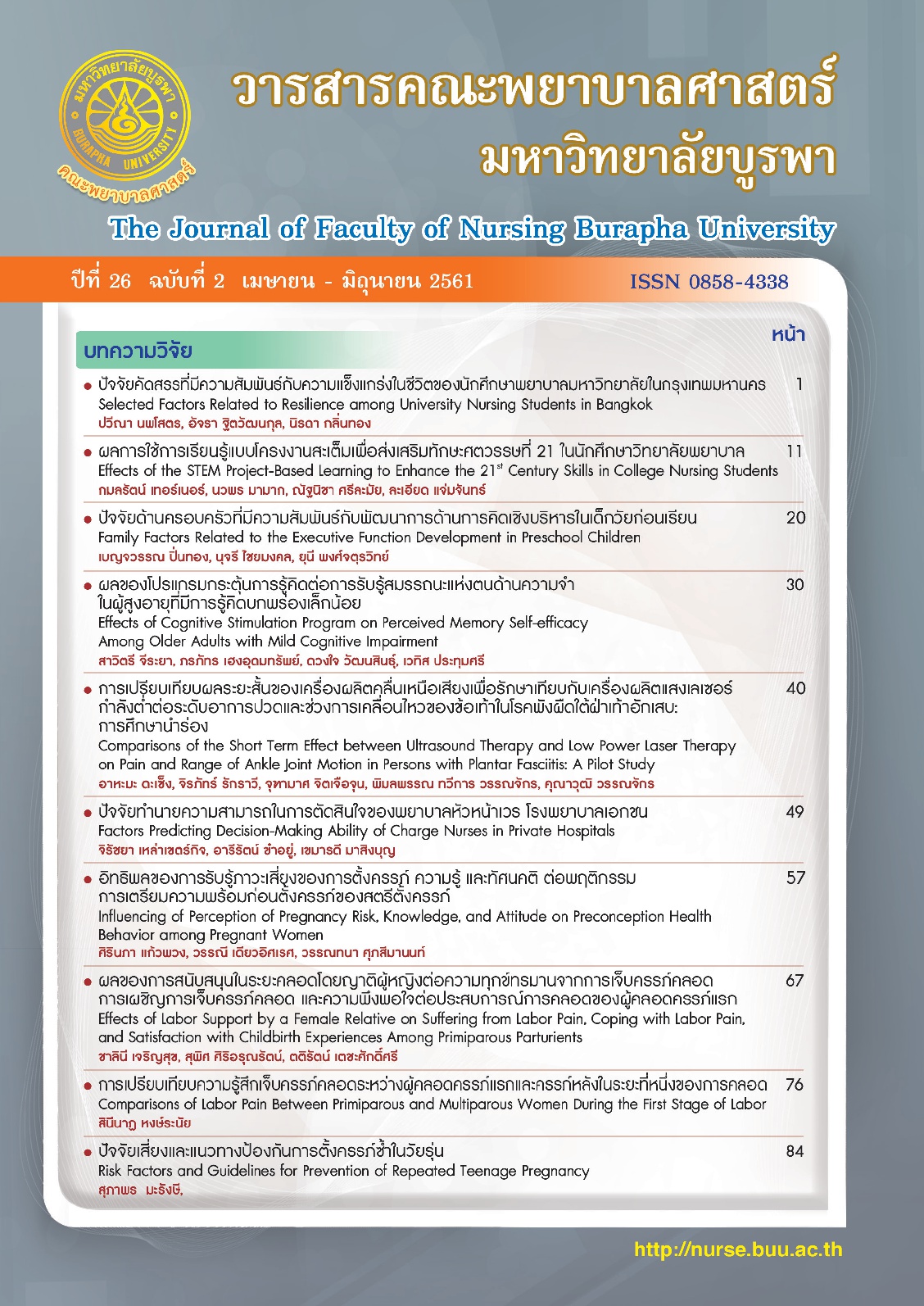Selected Factors Related to Resilience among University Nursing Students in Bangkok
คำสำคัญ:
Resilience, nursing students, perceived self-efficacy, coping ability in facing adversity, social support from peersบทคัดย่อ
This descriptive correlational research aimed to determine relationships between
selected factors, including sex, parental marital status, monthly income, Grade Point Average (GPA), coping ability in facing adversity, perceived self-efficacy and social support from peers, and resilience among university nursing students. A purposive sampling was used to recruit 176 nursing students in a university in Bangkok. Research instruments included a demographic questionnaire, the Resilience Quotient’s scale, the Perceive Self-efficacy’s scale, the Adversity Quotient’s scale, and the Perceived Social Support from Friends’ scales. Their Cronbach’s alpha reliabilities were .79, .83, .88, and .93, respectively. Descriptive statistics and Pearson’s Product-moment correlation coefficients were used to analyze the data.
The results revealed that the mean score of resilience was at a normal level (M =
62.86, SD = 7.04), and 79.5% and 20.5% of the sample had their resilience at normal and high levels (M = 60.54, SD = 5.91 and M = 71.86, SD = 2.07, respectively). Monthly income, perceived self-efficacy, coping ability in facing adversity, and social support from peers were positively correlated with resilience (r = .16, p<.05, r = .48, p<.001, r = .43, p<.001, and r = .30 p<.001, respectively). These findings suggest that the university should provide a special job for nursing students to increase personal monthly income. In addition, perceived self-efficacy, coping ability in facing adversity, and social support from peers should also be promoted which could be positively consequent to increase resilience among nursing students.
เอกสารอ้างอิง
Psychological Review, 84(2), 191-215.
Brandt, P. A., & Weinert, C. (1981). The PRQ - A social support measure. Nursing Research, 30(5), 277-280.
Chompunud, S., & Inkaew, W. (2012). Resilience quotient, emotional quotient, and stress of
the nursing students, Thai Red Cross College of Nursing. Journal of Psychiatric Nursing and Mental Health, 26(2). [in Thai]
Collishaw, S., Pickles, A., Messer, J., Rutter, M., Shearer, C., & Maughan, B. (2007). Resilience
to adult psychopathology following childhood maltreatment: Evidence from a community sample. Child Abuse & Neglect, 31, 211-229.
Department of Mental Health. (2007). The Thai National Mental Health Survey. Nonthaburi:
Information center Bareau of Mental Health Ministry of Public Health. [in Thai]
Fuangfupong, K. (2011). An individual research submitted in partial fulfilment of the
requirements for the degree of master of art in industrial and organizational psychology. (Master’s Thesis in Department of Psychology Faculty of Liberal Arts. Thammasat University, Graduate School. [in Thai]
Grotberg, E. H. (1995). A guide to promoting resilience in children: Strengthening the human
spirit. The Hague: The Bernard van Leer Foundation.
Hongkittiyanon, W. (2005). A study of employee perception of emotional quotient, adversity
quotient and learning style in a medical equipment factory (Master’s thesis). Pathum Thani, Thammasat University. [in Thai]
Jannoppacun, J., & Suppapitiporn, S. (2015). Predictive factors to resilience quotient (RQ) of
newly rotating graduated nurses of King Chulalongkorn Memorial Hospital. Thai Journal of Nursing Council, 30(2), 113-126. [in Thai]
Krejcie, R. V., & Morgan, D. W. (1970). Determining sample size for research activities.
educational and psychological measurement, 30(3), 607-610.
Nakwaree, K., Nintachan, P., & Sangon, S. (2015). Effect of the resilience enhancing program in junior high school students. The Journal of Psychiatric Nursing and Mental Health, 29(2), 46-63. [in Thai]
Nimnuan, B. (2004). Self-efficacy and home care activities for persons with schizophrenia among caregivers (Master’s Thesis). Chiang Mai, Chiang Mai University. [in Thai]
Nimitniwat, S. (2010). Development of non-formal education activities based on neo-
humanist concept and collaborative learning to develop adversity quotient of
students in private universities. Bangkok: Chulalongkorn University press. [in Thai]
Nintachan, P., Wanaleesin, S., Sanseeha, L., Thummathai, K., & Orathai, P. (2011). Resilience and Thai youth risk behavior. Ramathibodi Nursing Journal, 17(3), 430-443. [in Thai]
Nintachan, P. (2015). Resilience: concept, assessment, and application. Bangkok: Judtong. [in Thai]
Ouppor, W., Keitlertnapha, P., & Akkadechanunt, T. (2009). Perceived self-efficacy and outcome expectation toward conducting research and research productivity among nursing instructors in nursing colleges under the jurisdiction of Praboromrajchanok institute. Journal of Nursing and Education, 2(1), 29-38. [in Thai]
Procidano, M. E., & Heller, K. (1983). Measures of perceived social support from friends and family:
three validation studies. American Journal of Community Psychology, 11(1), 2-20.
Srichai, A., Dallas, J. C., & Hengudomsub, P. (2016). Relationships between family
connectedness, negative life event, emotional quotient and mental health status of high school students. The Journal of Faculty of Nursing Burapha University, 24(4), 65-76. [in Thai]
Stoltz, P. G. (1997). Adversity quotient: turning obstacles into opportunities. New York:
John Wiley & Sons.
Suksri, A., Nintachan, P., & Taweekoon, T. (2016). Relationships between resilience and depression
and aggressive behaviors in adolescents exposed to violence. Ramathibodi Nursing Journal, 30(2), 97-112. [in Thai]
Vatanasin, D., Hengudomsub, P., Vatanasin, S., Asarath, T., Chupan, S., & Srisopa, P. (2015). Factors
predicting depression among health science students. The Journal of Faculty of Nursing Burapha University, 23(4), 31-47. [in Thai]





